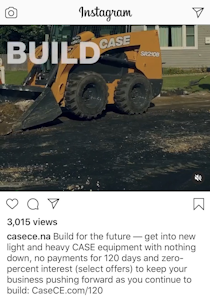
Can shell-shocked contractors be prompted to buy in these uncertain times?
The financing challenge is actually two-fold, says David Sutton, president, Kubota Credit. “We want to help the dealers attract and incent customers to buy and we want to make sure the customers we have are comfortable with their current loans.”
“We’ve taken very proactive steps to make sure we’re supporting our customers and dealers during this crisis,” says Brian Layman, vice president, construction equipment financial services, Volvo Financial Services, U.S.
What’s being offered
Here’s a quick rundown of the offers we’ve seen to date. (There may be more, but these are the ones we’re aware of.)
Kubota: 90-day deferral of the first payment on equipment purchased through May, an offer that may be extended if present conditions persist. A 60-day extension on current loans (April payments would be due in June).
Volvo Construction Equipment/Volvo Financial Services: 90-day payment deferral for qualified buyers, “pick-a-skip” payment for one payment during the year, up to $1,000 credit on a Smart Commercial Account for selected machine purchases. Volvo also has a range of machine-specific offers that have 0 percent interest rates.
Terex Financial Services: On new orders, Terex is offering a “no payments/no interest until Labor Day” deal on new orders (credit approval required). “The thought is to give our customers some breathing room as we realize even when activity starts to pick up, the collection of receivables from their customers may lag,” says Jamie Gibson, global director, Terex Financial Services.

Case Construction Equipment’s current offer on Instagram.
Case Construction Equipment: The company is advertising on social media that buyers can get into new light and heavy Case equipment “with nothing down, no payments for 120 days and zero-percent interest (select offers).”
Caterpillar: Contractors buying compact equipment (skid steers, compact track loaders, compact equipment, compact wheel loaders, backhoes, small wheel loaders, small dozers and telehandlers) have a “choose your zero percent offer:” either zero percent interest with zero down for 60 months or 36 months of the same offer with a Customer Value Agreement. Hawthorne Cat, covering San Diego, Hawaii and the Pacific Region, says it is offering 1.99-percent financing for 48 months in addition to a Customer Value Agreement. The offer is available on new Cat articulated trucks, dozers, motor graders, medium loaders, and medium and large excavators, says Hawthorne.
Vermeer: The Vermeer Essential Partners program has various solutions customized to customer needs. Options available through May 2020 include “aggressive flexible financing, a 90-day deferred payment as well as other possibilities for customers looking to rent equipment for work during the short term,” says Dave Wisniewski, vice president of commercialization.
Can you get credit?
Credit requirements haven’t changed, Gibson says, although Terex is starting to ask virus-related questions such as how a business would handle a 60- to 90-day work stoppage and an applicant’s available sources of liquidity. Right now, Terex is seeing more requests for new equipment financing, which may change if more used equipment becomes available.
Customer needs are mixed, Layman points out. In some states, most construction is shut down, and in other states contractors are working with little impact, he says. And customers are still buying new and used equipment. “Our customer backlogs seem to still be pretty strong, but we do expect to see a decline in new applications 30 to 60 days out,” Layman says.
“Of Kubota’s 1,045 dealer locations, all of about 25 have stayed open the entire time and several of them have reopened with perhaps shortened hours,” Sutton says. “When I look at our April approvals so far, and compare them year over year, we’re actually up about 4 percent. A lot of our dealers are in rural markets so they’re not as impacted as urban businesses.”
Flexibility on current loans
“We’re taking a more broad portfolio approach on how we are managing requests,” Layman says. “Generally, requests for flexibility are handled on a one-by-one basis based on a customer’s specific needs. Now we’re seeing customers make a significant number of different payment requests and we’re doing our best to accommodate them.”
Kubota Credit is currently offering a 60-day extension of April payments, pushing the due date out to June, and adding the missing payments at the end of the note. “There’s no time frame on that,” Sutton says. “We’re taking it month to month and seeing how things go.”
And, as Sutton points out, payment flexibility now will mean that the terms of the loan will be longer.
But what if you’re already under water?
“Call your lenders immediately,” Gibson advises. “We understand this has nothing to do with how they have run their business and everything to do with a global pandemic.”
“The one thing that we’re keying on is that we want the customers as they go through this to have a good experience with Kubota because we want them to continue to be customers,” Sutton says. “We think this will be a short interruption in a good economy and we expect it continue to be good after the recovery.”
“The main thing I’ve stressed with myself and with my team is to continually stay in contact with our customers,” Gibson adds. “No one really knows at this point how it’s going to play out.”
Great Recession of 2020?
“I think it’s a bit too early to make direct comparisons to 2008,” Layman says. “We need more time to determine how quickly the overall economy can recover.”
“The U.S. financial system is much healthier and better equipped to assist than what it was during the Great Recession,” Gibson says.
Adds Sutton: “The Great Recession was a cash recession. This is basically a shut down and the cash is still there. There’s plenty of money available. The worst case would be if this lingered into the fall or winter. But if we can open up in June or July, the demand is still there.”
